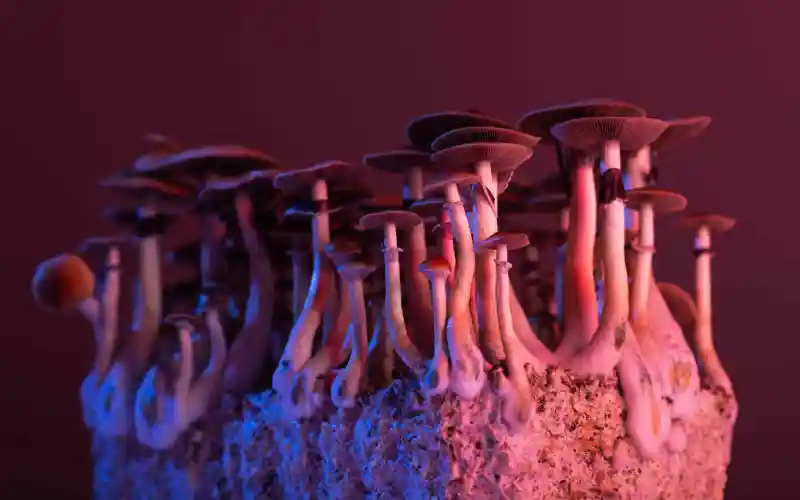Connect with us
Published
7 months agoon

Ahead of the competition, drug developers are locking in patents while the psychedelic renaissance takes the medical community by storm.
Enveric Biosciences, a biotechnology company focusing on the development of novel drugs primarily for the treatment of depression, anxiety, and addiction disorders, announced in a Sept. 20 press release that the United States Patent and Trademark Office issued a patent for its carboxylated psilocybin-derived drug delivery system.
U.S. Patent No. 11,752,130, titled “Carboxylated Psilocybin Derivatives and Methods of Using,” applies to Enveric’s EVM301 Series of molecules being developed as potential treatments for mental health disorders.
This patent was originally issued Sept. 12,, giving Enveric intellectual property rights with claims to novel compositions and pharmaceutical drug formulations for a family of carboxylated derivatives of tryptamine-based drug candidates. They believe their drug delivery system is unique.
The goal is to further strengthen and add value to Enveric’s “EVM301 Series” of compounds. Enveric’s EVM301 Series encompasses new chemical entity tryptamine derivatives designed to engage the serotonin 5HT2a receptor and other neurotransmitter receptors with the intent to promote neuroplasticity and therapeutic benefit without inducing hallucinatory effects.
“Our EVM301 Series consists of small molecule therapies designed with the intent to enhance neuroplasticity while reducing or eliminating hallucinations associated with other psychedelic or psychedelic-inspired agents,” said Joseph Tucker, Ph.D., Director and CEO of Enveric.
“This unique design could be potentially game-changing in the treatment of depression and anxiety as it offers the opportunity to administer psilocybin-derived medications without the requirement for a healthcare professional to observe during dosing,” Tucker continued. “We believe this could greatly enhance the commercial opportunity of EVM301 Series-based therapies, benefiting patients and healthcare systems broadly by reducing the need for costly and time-intensive requirements for supervision throughout the treatment. For these reasons, Enveric is seeking to build a robust intellectual property portfolio for our EVM301 Series with this U.S. patent providing a critical IP cornerstone.”
The patent describes psilocybin’s role in history, both as a recreational drug in mushrooms and as a medicinal compound. It provided that while psilocybin is relatively low in toxicity, bad trips are fairly common in certain doses.
After a new drug has undergone approvals and is being marketed, its patents protect it from competition, i.e. chemically identical drug candidates. This increases its value.
Enveric’s lead program, the EVM201 Series, is made up of the drug candidates using the active metabolite, psilocin. Enveric is developing the first product from the EVM201 Series—EB-373—for the treatment of psychiatric disorders. Not everyone needs exactly an ego death in order to gain benefits. Enveric is also advancing its second program, the EVM301 Series, expected to offer a first-in-class, new approach to the treatment of difficult-to-address mental health disorders, mediated by the promotion of neuroplasticity—without also inducing hallucinations in the patient.
Research showing the efficacy of psilocybin for certain disorders continues to grow. A newly published study provides yet more evidence that psilocybin serves as a potentially effective treatment for those suffering from depression.
A study by American Medical Association, published late last month, sought to measure the “efficacy and safety of psilocybin in patients with major depressive disorder” and to “evaluate the magnitude, timing, and durability of antidepressant effects and safety of a single dose of psilocybin in patients with [major depressive disorder].”
“A 25-mg dose of psilocybin was well tolerated and may hold promise as a treatment for major depressive disorder when combined with psychological support,” the authors of the study wrote.
“Psilocybin shows promise as a treatment for major depressive disorder.”
Another recent study focused on psilocbyin’s ability to disrupt stubborn networks in the brain and along with other psychedelics, improve neuroplasticity ideal for battling depression and addiction.
In a recently published preprint study, entitled “Psilocybin desynchronizes brain networks,” researchers analyze the comparison between psilocybin and the default mode network (DMN) of the brain.
“Psilocybin-driven desynchronization was observed across [the] association cortex but strongest in the default mode network (DMN), which is connected to the anterior hippocampus and thought to create our sense of self,” researchers explained.
According to the study, the largest areas of the DMN that were affected by psilocybin in the patients included the thalamus, basal ganglia, cerebellum, and hippocampus. “Persistent suppression of hippocampal-DMN connectivity represents a candidate neuroanatomical and mechanistic correlate for pro-plasticity and anti-depressant effects of psilocybin,” researchers wrote in their abstract.
Researchers continue to uncover ways that psilocybin and similar compounds can improve mental well-being.
More psychedelics are being embraced by federal regulations, and getting patents in the process. Johnson & Johnson renamed its version of ketamine, esketamine in order to patent and sell it under the brand name Spravato.


Study Reveals State Cannabis Legalization Lowers Immigrant Deportation


DEA Challenges Bid To Use Psilocybin Under ‘Right To Try’ Legislation


Vegans Rejoice as Farmers Switch from Chickens to Hemp


Louisiana Legislative Committee Unanimously Passes Adult-Use Cannabis Framework Bill


Louisiana House Bill to Regulate Hemp Products Advances Along With Senate Bill to Ban


Cresco Labs Workers Reportedly De-Unionize
